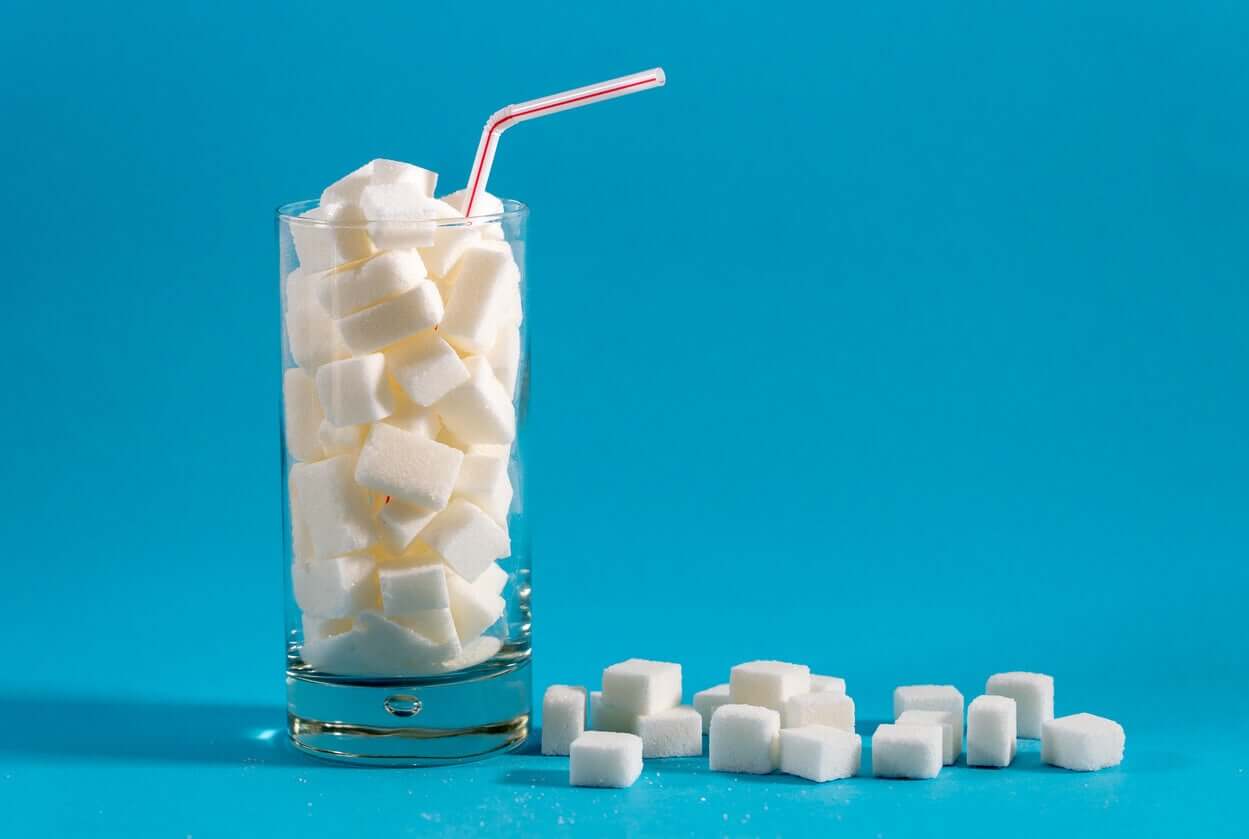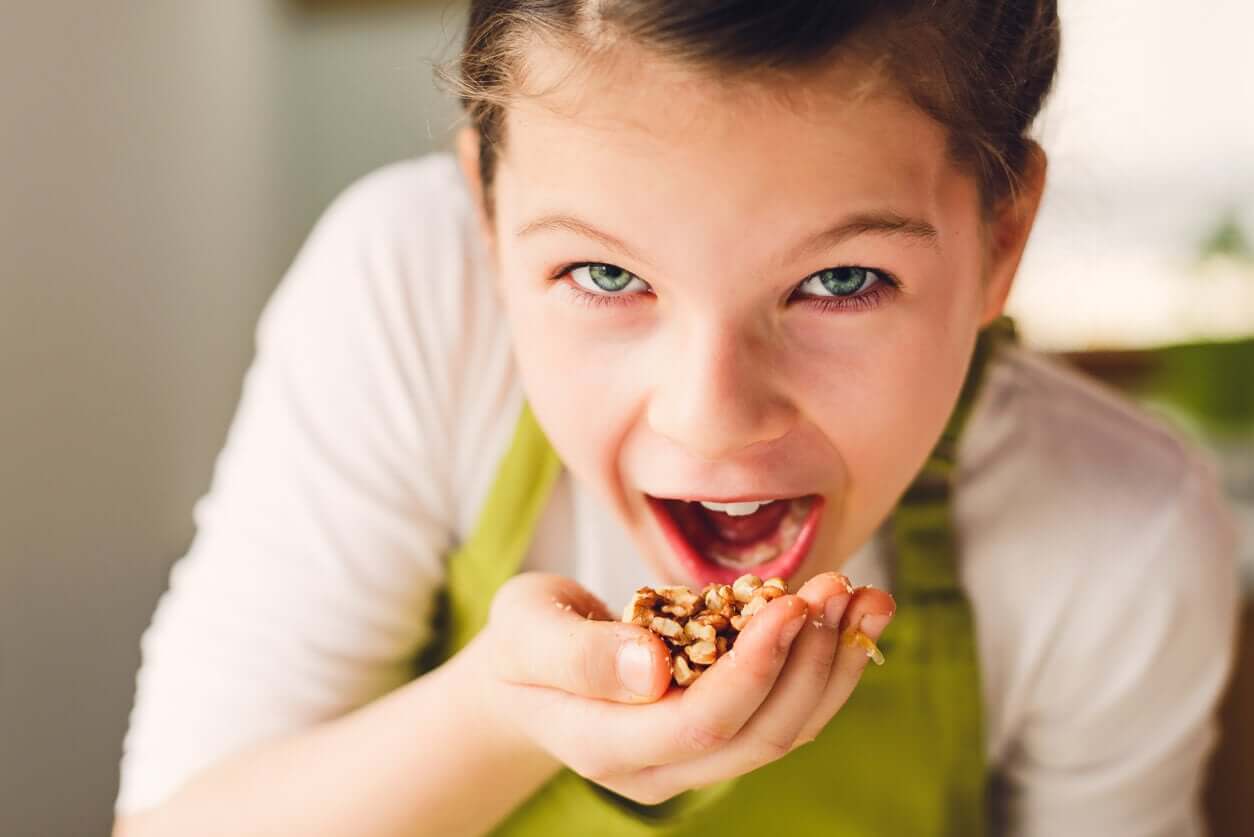5 Foods You Should Avoid to Take Care of Your Children's Teeth

As parents, we always have questions about what foods to avoid in order to take care of our children’s teeth. This question is very important, as diet plays a fundamental role in the health of children.
Many foods can act negatively on the oral cavity and therefore, in this article, we’ll tell you what products you should limit in order to protect the oral health of children. Don’t miss it!
1. Sweets and candies
Surely you already know that sweets or sweets are foods that should be avoided for the sake of the health of your children’s teeth. These products are high in sugar, which helps bacteria in the mouth grow and develop.
The sugar in sweets remains in the oral cavity for a long time as it adheres to tooth surfaces. The microorganisms in the mouth overgrow around it and form large accumulations of bacterial plaque.
In addition, the fermentation of sugars favors the production of acids that demineralize the hard tissues of the tooth. The loss of these minerals is what gives rise to cavities.
All sweets and candies are cariogenic, but some are more dangerous than others. Chewy or sticky candies, for example, adhere the most to the surfaces of the teeth and remain there for long periods of time.
Hard candies and lollipops are also quite harmful. Sucking them means that sugar remains in the oral cavity for a very long time, which gives the bacteria time to produce huge amounts of acid.
In addition, if they’re very hard, biting them can damage the enamel of the teeth or overexert the jaw joint. And when you chew them, the remains of the treat are trapped on the surfaces and in the spaces between the molars.
It’s true that children really enjoy eating these types of sweets, but they¿re not a beneficial product for their health. In fact, the ingestion of large amounts of sugar not only affects the state of the mouth, but also affects the general health of little ones.
Therefore, it’s best to limit the amount of sweets or at least limit their consumption to special occasions. If children eat some candy at a party or birthday, then they should have a good tooth brushing afterwards to avoid possible damage.
2. Acidic drinks

Soft drinks, both traditional and diet, juices, and sports drinks, are characterized by their acidity and high sugar content. For this reason, they’re also foods that you should avoid to take care of your children’s teeth.
The high acidity of these carbonated beverages damages tooth enamel in the same way as bacteria: By demineralizing the hard tissues of the teeth. In addition, the high sugar content enhances this situation.
Sports drinks are often considered healthy and ideal liquids for children who exercise. But the truth is that they’re also very acidic and can cause damage to the teeth.
The ideal drink for children is water. However, if flavored liquids are preferred, it’s always a good idea to opt for natural foods with no added sugars. For example, mixing water with some fruit or vegetable juice can be a refreshing and less harmful alternative.
3. Pastries and cookies
Industrial pastries and biscuits contain refined carbohydrates that promote bacterial metabolism. Their soft texture makes it easier for their remains to remain adhered to tooth surfaces and their high sugar content favors the appearance of cavities.
Cookies are often the easy go-to snack when no other food’s available. But you should avoid their excessive consumption and plan their snacks well.
When you finish eating, the best thing to do is to properly brush your teeth and floss to prevent remains from being trapped in your mouth.
4. Sugar
We already mentioned that sugar favors the development of bacteria in the mouth and its excessive consumption poses a risk to oral health.
Many industrialized food products contain added sugar and its consumption is more difficult to avoid. But in the case of homemade meals, it’s essential that you reduce the addition of sweeteners.
Many times, when preparing meals or drinks for children, parents tend to add sugar to make the food more acceptable. But it’s important not to fall into this habit and avoid putting spoonfuls of sweetener into everything that your little ones ingest.
Milk and infusions, for example, can be taken without sweetening.
It’s also important not to wet children’s pacifiers and bottles in honey or sugar, as these are harmful habits that promote the development of cavities from an early age.
5. Hard foods
We already mentioned the damage that the ingestion of hard candies can cause, but there are other products that, due to their firmness, can damage the teeth.
Ice is an example, as chewing it causes a weakening or rupture of tooth enamel. Getting into the habit of chewing frozen ice cubes can end up cracking your teeth.
Very hard nuts, such as walnuts and almonds, can also damage teeth or braces.

A healthy diet
Eating a varied, balanced, and nutritious diet is very important for the proper growth and development of infants. In addition, a healthy diet helps prevent several of the most common oral diseases, such as cavities and gingivitis.
Ideally, children should get used to eating a healthy diet that includes dairy, fruits, and vegetables. Likewise, avoid the foods that we’ve mentioned in order to take better care of your children’s teeth.
As parents, we always have questions about what foods to avoid in order to take care of our children’s teeth. This question is very important, as diet plays a fundamental role in the health of children.
Many foods can act negatively on the oral cavity and therefore, in this article, we’ll tell you what products you should limit in order to protect the oral health of children. Don’t miss it!
1. Sweets and candies
Surely you already know that sweets or sweets are foods that should be avoided for the sake of the health of your children’s teeth. These products are high in sugar, which helps bacteria in the mouth grow and develop.
The sugar in sweets remains in the oral cavity for a long time as it adheres to tooth surfaces. The microorganisms in the mouth overgrow around it and form large accumulations of bacterial plaque.
In addition, the fermentation of sugars favors the production of acids that demineralize the hard tissues of the tooth. The loss of these minerals is what gives rise to cavities.
All sweets and candies are cariogenic, but some are more dangerous than others. Chewy or sticky candies, for example, adhere the most to the surfaces of the teeth and remain there for long periods of time.
Hard candies and lollipops are also quite harmful. Sucking them means that sugar remains in the oral cavity for a very long time, which gives the bacteria time to produce huge amounts of acid.
In addition, if they’re very hard, biting them can damage the enamel of the teeth or overexert the jaw joint. And when you chew them, the remains of the treat are trapped on the surfaces and in the spaces between the molars.
It’s true that children really enjoy eating these types of sweets, but they¿re not a beneficial product for their health. In fact, the ingestion of large amounts of sugar not only affects the state of the mouth, but also affects the general health of little ones.
Therefore, it’s best to limit the amount of sweets or at least limit their consumption to special occasions. If children eat some candy at a party or birthday, then they should have a good tooth brushing afterwards to avoid possible damage.
2. Acidic drinks

Soft drinks, both traditional and diet, juices, and sports drinks, are characterized by their acidity and high sugar content. For this reason, they’re also foods that you should avoid to take care of your children’s teeth.
The high acidity of these carbonated beverages damages tooth enamel in the same way as bacteria: By demineralizing the hard tissues of the teeth. In addition, the high sugar content enhances this situation.
Sports drinks are often considered healthy and ideal liquids for children who exercise. But the truth is that they’re also very acidic and can cause damage to the teeth.
The ideal drink for children is water. However, if flavored liquids are preferred, it’s always a good idea to opt for natural foods with no added sugars. For example, mixing water with some fruit or vegetable juice can be a refreshing and less harmful alternative.
3. Pastries and cookies
Industrial pastries and biscuits contain refined carbohydrates that promote bacterial metabolism. Their soft texture makes it easier for their remains to remain adhered to tooth surfaces and their high sugar content favors the appearance of cavities.
Cookies are often the easy go-to snack when no other food’s available. But you should avoid their excessive consumption and plan their snacks well.
When you finish eating, the best thing to do is to properly brush your teeth and floss to prevent remains from being trapped in your mouth.
4. Sugar
We already mentioned that sugar favors the development of bacteria in the mouth and its excessive consumption poses a risk to oral health.
Many industrialized food products contain added sugar and its consumption is more difficult to avoid. But in the case of homemade meals, it’s essential that you reduce the addition of sweeteners.
Many times, when preparing meals or drinks for children, parents tend to add sugar to make the food more acceptable. But it’s important not to fall into this habit and avoid putting spoonfuls of sweetener into everything that your little ones ingest.
Milk and infusions, for example, can be taken without sweetening.
It’s also important not to wet children’s pacifiers and bottles in honey or sugar, as these are harmful habits that promote the development of cavities from an early age.
5. Hard foods
We already mentioned the damage that the ingestion of hard candies can cause, but there are other products that, due to their firmness, can damage the teeth.
Ice is an example, as chewing it causes a weakening or rupture of tooth enamel. Getting into the habit of chewing frozen ice cubes can end up cracking your teeth.
Very hard nuts, such as walnuts and almonds, can also damage teeth or braces.

A healthy diet
Eating a varied, balanced, and nutritious diet is very important for the proper growth and development of infants. In addition, a healthy diet helps prevent several of the most common oral diseases, such as cavities and gingivitis.
Ideally, children should get used to eating a healthy diet that includes dairy, fruits, and vegetables. Likewise, avoid the foods that we’ve mentioned in order to take better care of your children’s teeth.
All cited sources were thoroughly reviewed by our team to ensure their quality, reliability, currency, and validity. The bibliography of this article was considered reliable and of academic or scientific accuracy.
- González Sanz, Á. M., González Nieto, B. A., & González Nieto, E. (2013). Salud dental: relación entre la caries dental y el consumo de alimentos. Nutrición hospitalaria, 28, 64-71.
- Hernández-Cantú, E. I., Reyes-Silva, A. K. S., Garcia-Pineda, M. A., González-Montalvo, A., & Sada-Amaya, L. J. (2018). Hábitos de higiene bucal y caries dental en escolares de primer año de tres escuelas públicas. Rev Enferm Inst Mex Seguro Soc [Internet], 3(26), 179-85.
- Ventura Borda, C. A. (2017). Variación del ph salival antes y después del consumo de alimentos cariogénicos en los niños de la IEI San Martín de Porres N° 383, Calca-2017.
- Arévalo Manzaba, L. S. (2019). Factores de riesgo asociados a la caries de la infancia temprana (Bachelor’s thesis, Universidad de Guayaquil. Facultad Piloto de Odontología).
- Guerra, M. H., Rondón, N. D., Zamudio, Y. C., & Hoffmann, I. M. (2018). Hábitos alimenticios y su relación con la caries de la primera infancia.
- Gayá, V. (2018). Chucherías: dulce y maldita tentación: Caries, obesidad y diabetes, consecuencias de su consumo excesivo. El siglo de Europa, (1266), 9.
- Andrés, E. C. (2018). Factores de riesgo asociados a la aparición de nuevas lesiones de caries en primeros molares permanentes (Doctoral dissertation, Universitat de València).
- Alvarado Silva, U. (2018). Calidad Nutricional y Caries Dental de los niños de 3 a 5 años del Centro Materno Infantil de Villa María del Triunfo, Lima, 2018.
- Alcívar Pinela, A. G. (2019). Potencial cariogénico de los alimentos en las loncheras y su influencia en el índice de caries (Bachelor’s thesis, Universidad de Guayaquil. Facultad Piloto de Odontología).
This text is provided for informational purposes only and does not replace consultation with a professional. If in doubt, consult your specialist.








